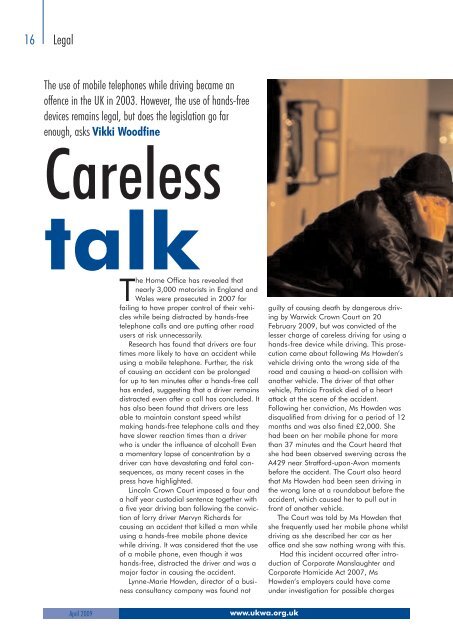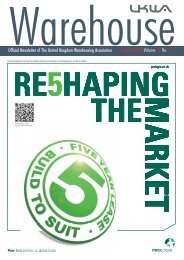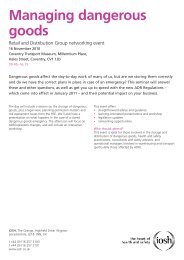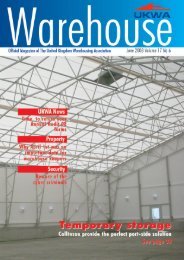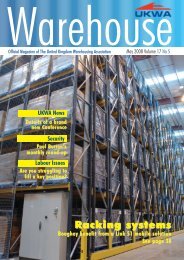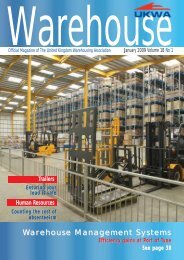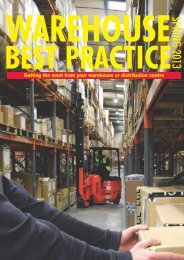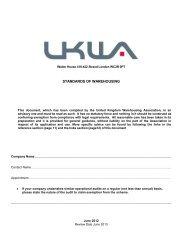ukwa 2 cover - United Kingdom Warehousing Association
ukwa 2 cover - United Kingdom Warehousing Association
ukwa 2 cover - United Kingdom Warehousing Association
Create successful ePaper yourself
Turn your PDF publications into a flip-book with our unique Google optimized e-Paper software.
16 Legal<br />
The use of mobile telephones while driving became an<br />
offence in the UK in 2003. However, the use of hands-free<br />
devices remains legal, but does the legislation go far<br />
enough, asks Vikki Woodfine<br />
Careless<br />
talk<br />
The Home Office has revealed that<br />
nearly 3,000 motorists in England and<br />
Wales were prosecuted in 2007 for<br />
failing to have proper control of their vehicles<br />
while being distracted by hands-free<br />
telephone calls and are putting other road<br />
users at risk unnecessarily.<br />
Research has found that drivers are four<br />
times more likely to have an accident while<br />
using a mobile telephone. Further, the risk<br />
of causing an accident can be prolonged<br />
for up to ten minutes after a hands-free call<br />
has ended, suggesting that a driver remains<br />
distracted even after a call has concluded. It<br />
has also been found that drivers are less<br />
able to maintain constant speed whilst<br />
making hands-free telephone calls and they<br />
have slower reaction times than a driver<br />
who is under the influence of alcohol! Even<br />
a momentary lapse of concentration by a<br />
driver can have devastating and fatal consequences,<br />
as many recent cases in the<br />
press have highlighted.<br />
Lincoln Crown Court imposed a four and<br />
a half year custodial sentence together with<br />
a five year driving ban following the conviction<br />
of lorry driver Mervyn Richards for<br />
causing an accident that killed a man while<br />
using a hands-free mobile phone device<br />
while driving. It was considered that the use<br />
of a mobile phone, even though it was<br />
hands-free, distracted the driver and was a<br />
major factor in causing the accident.<br />
Lynne-Marie Howden, director of a business<br />
consultancy company was found not<br />
guilty of causing death by dangerous driving<br />
by Warwick Crown Court on 20<br />
February 2009, but was convicted of the<br />
lesser charge of careless driving for using a<br />
hands-free device while driving. This prosecution<br />
came about following Ms Howden’s<br />
vehicle driving onto the wrong side of the<br />
road and causing a head-on collision with<br />
another vehicle. The driver of that other<br />
vehicle, Patricia Frostick died of a heart<br />
attack at the scene of the accident.<br />
Following her conviction, Ms Howden was<br />
disqualified from driving for a period of 12<br />
months and was also fined £2,000. She<br />
had been on her mobile phone for more<br />
than 37 minutes and the Court heard that<br />
she had been observed swerving across the<br />
A429 near Stratford-upon-Avon moments<br />
before the accident. The Court also heard<br />
that Ms Howden had been seen driving in<br />
the wrong lane at a roundabout before the<br />
accident, which caused her to pull out in<br />
front of another vehicle.<br />
The Court was told by Ms Howden that<br />
she frequently used her mobile phone whilst<br />
driving as she described her car as her<br />
office and she saw nothing wrong with this.<br />
Had this incident occurred after introduction<br />
of Corporate Manslaughter and<br />
Corporate Homicide Act 2007, Ms<br />
Howden’s employers could have come<br />
under investigation for possible charges<br />
April 2009<br />
www.<strong>ukwa</strong>.org.uk


